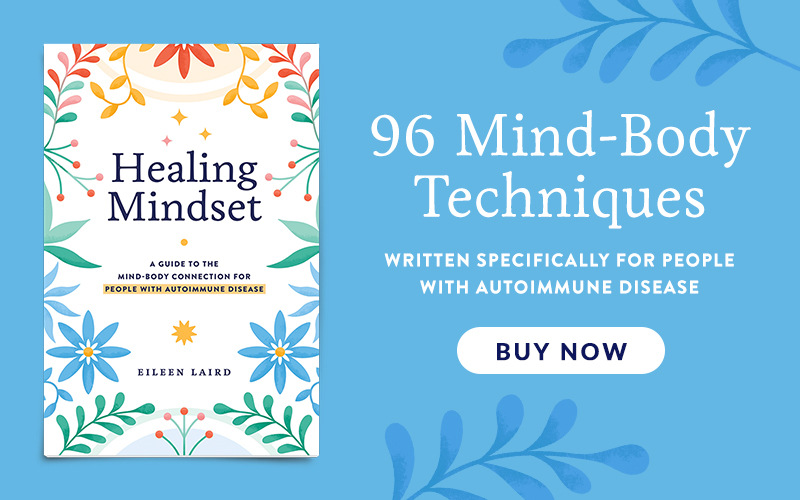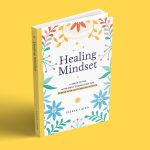
“Habits are the invisible architecture of daily life. We repeat about 40 percent of our behavior almost daily, so our habits shape our existence, and our future. If we change our habits, we change our lives.”
~ Gretchen Rubin
The Power of Habit Change
When it comes to improving autoimmune health, cultivating positive habits is key. Sometimes it feels like bad habits are easy to keep and good habits are easy to break, but the truth is we all have healthy habits in our lives already. When they’re part of our normal routine, we take them for granted. Do you brush your teeth every day? That’s a healthy habit. One reason habit change can feel difficult is that we’re adding something new to our routine, and that requires effort and adjustment. The good news is that new habits can eventually become routine too. I don’t mean they become boring. I mean they become easier to do because they’re simply part of the rhythm of our days.
Whether you’re focusing on stress reduction, improving your sleep, incorporating healthy movement, or changing your diet, it helps to remember that new habits also come with rewards. Positive habits can bring positive changes to our lives: less inflammation, less fatigue, more abilities, more joy, and more health.
1. Find Your Why
What’s your motivation for creating new positive habits? What are your goals for health and happiness? In what ways might your life improve? Clarify those visions in your mind. They’re often the foundation of a new habit, giving us motivation when we’re feeling tired, uninspired, or “too busy”. For me, my goal is less inflammation in my body and less reactivity in my mind. I want peace and health at every level. That goal is worth the effort I put into achieving it.
2. Know Your Habit Personality
Gretchen Rubin is a bestselling author who specializes in happiness and habit change. She discovered that people have one of four habit personalities: upholder, obliger, questioner, and rebel.
Upholders are a small group of people who find habit change pretty easy. They can meet the goals they set for themselves and goals set by other people (deadlines, responsibilities, etc.) They are rare people!
Obligers need external accountability. They excel at meeting other people’s expectations but often fail at meeting their own. Classes, coaches, and habit buddies are very helpful for obligers.
Questioners meet any goal that makes sense to them. If they believe something is worthwhile, they’ll get it done. If something seems illogical or arbitrary, they’ll refuse to do it. Symptom journals are very helpful for questioners because they can track their results.
Rebels, like their name, rebel against all expectations. The tagline is “You can’t make me, and neither can I!” They do best when a goal aligns with their feelings of identity, and when there’s flexibility and freedom for how that goal is achieved.
Which one of these tendencies resonates with you? Knowing this nature in ourselves can help us choose the best way to approach a new habit. I recorded a podcast with a panel of autoimmune warriors, each with a different habit personality, sharing the habit practices that work best for them. Listen here.
3. Prepare for Obstacles
Human beings are wired for comfort. We naturally resist change, even when that change is beneficial. We also have routines in our daily lives that are designed to support the status quo. So, when it comes to starting a new habit, take an honest look at your life and see where you can make space, and how you can create a structure of support around that habit. At the same time, consider which obstacles are most likely to arise. That allows you to come up with solutions in advance.
What time of day will be dedicated to this new habit? How might this time get “stolen” for something else? What other responsibilities? What personal temptations? How can you protect this time? Can you have an alternate time in your day as a back-up plan?
Which people in your life are the most encouraging? Reach out to them for support in advance. Are there also people in your life who might try to sabotage your efforts? Consider how you will respond in those moments. Can you talk to them ahead of time and ask for their support? If they refuse to be supportive, can you limit your interaction with them?
Lastly, what internal obstacles will you face? It’s natural to have resistance to a new habit, even one we want to do. It’s one of the contradictions of human nature. Simply knowing this may happen and making a choice push through that resistance, can be helpful.
4. Keep Track
When it comes to habit tracking, two tools are helpful: a symptom journal and a record of accomplishment. For your symptom journal, start with a baseline of how you feel right now. What are your most challenging symptoms, mentally and physically? Some categories to consider would be autoimmune symptoms, pain, mobility, digestion, sleep, fatigue, mood, brain fog, and stress levels. You can then update your journal on a daily basis, to see how you feel on a day that you’ve incorporated your new habit vs. a day you didn’t. But I think the most powerful part of a symptom journal is being able to track improvements over time. What changes in your symptoms do you notice after a month of incorporating a new healthy habit into your life?
You’ll also want a record of doing your new habit. It’s like giving yourself a gold star every day. There’s something innately satisfying about checking things off a list. Habit apps are popular because they offer a tracking structure as well as reminders, but you can also keep a simple note on your phone or a calendar on your fridge.
5. Find a Habit Buddy
The support and accountability of someone else can strengthen motivation when we’re building a new habit. Do you have a friend in your life who would also like to make positive changes? You don’t have to choose the same habit to be accountable to each other. Just knowing you’re both doing something new on a daily (or almost daily) basis can be encouraging and strengthening for both of you.
A simple “habit buddy” practice is to text each other at the end of the day to check in and share how you did that day. You can also send each other encouraging texts throughout the day — affirmations that you’ve got this!
If there’s no one in your life who wants to be a habit buddy, groups and classes can fill this role as well. Research what’s available locally as well as online.
6. Consider a 30-Day Challenge
There’s a reason these are so popular. It’s long enough to push through the resistance of starting something new, and it’s also long enough to start gaining some confidence in your new habit. At the same time, it’s not too long. 30 days feels do-able. Know that you can start a 30-day challenge anytime. It doesn’t have to be the first of the month or the first of the year. Today is a great day to begin!
7. Leave Perfectionism Behind
Adults don’t like being “bad” at something. Most hobbies are born from things we naturally excel at. We call these our talents and gifts, and it’s true that we all have those. But we are capable of more than what comes easily. Just look at children, especially babies and toddlers. Think of how much they didn’t know, and how much they learned in a short period of time. Did they give up on walking each time they fell down? Or refuse to speak because learning a new language was too hard? When you start something new, don’t expect it to be easy immediately. That’s not a sign of failure or that the new habit “isn’t for you.” Being bad at something is the first step towards eventually being good at it. Letting yourself symbolically fall a few times and wobble when you get back on your feet, eventually leads to walking with confidence. Focus on progress, not perfection. And if you decide to do a 30-day challenge, remember this: if you miss a day, that’s not a failure. That’s just a misstep. Keep going. If you meet your goal 25 days of the month, that’s a success and can have a huge positive impact on your life.
8. Habit Pairing
This is the simple technique of pairing a new habit with one already established. If you brush your teeth before bed every night and want to develop a gratitude practice, pair those together in your mind. Put your toothbrush by your gratitude journal, and always do those things one after the other. You can pair anything together. Maybe you want to meditate in the morning, but you also love starting your day with a cup of tea. Make that a pair. The tea can be the focus of your meditation, or you can choose it as a reward at the end of a guided meditation.
9. Create a Vision Board
Vision boards are an alternative to a written list of goals and resolutions. It’s abstract, aspirational, and can even tap into some unconscious goals and desires. Start by collecting some magazines. They’re not as easy to find as more and more publications go online, but they’re still sold in stores and found in libraries and doctor’s offices. Many places recycle old magazines as new ones arrive. Ask if you can pick up the old magazines at the start of a new month.
To create your vision board, cut out words and pictures that appeal to you and capture the feeling of the life you want to create. I love using a bulletin board as a flexible vision board, because I can add or remove things over time. However, if you want something more permanent, or you’d like to create a new vision board once a year, glue your cutouts to a piece of poster board. You may also enjoy using art supplies to handwrite words, draw images, or add a splash of color, shimmer, or texture. Have fun with this project! You can’t do it wrong.
10. Keep Learning
This article is an excerpt from my book, Healing Mindset, a guide to mind-body techniques for people with autoimmune disease. Every chapter includes beginner tips but also further resources, so you can deepen the practices that resonate with you the most. I’ve also written books about the Paleo Autoimmune Protocol, and this website has hundreds of free articles and podcasts about autoimmune nutrition and healthy lifestyle changes. There are so many opportunities to create habits that make our lives better! Don’t be overwhelmed by all the options. Baby steps make a difference. Choose one new habit you’d like to try today.
You May Also Be Interested In
Credit: image at top of page purchased from iStock.










Hi, Eileen!
I really like the idea of habit pairing and also using the habit you already enjoy doing as a reward for the new one. That’s a great idea.
I also loved that you pointed out that being bad at something is the first step towards being good at it. One thing I like to remember to counter perfectionism is “progress not perfection”.
I love those extra tips, Jacqueline! Thanks for sharing.